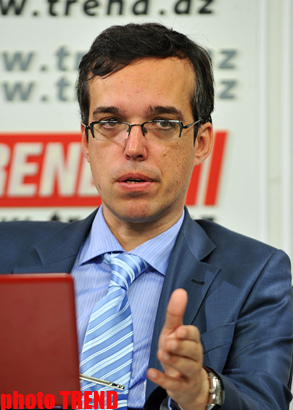The editor in chief of the Bulletin of the Caucasus information and analytical agency, the deputy dean of the History Department of Moscow State University, a member of the Trend Expert Council, a political scientist, Alexei Vlasov, specially for Trend.
An article by Thomas de Waal "The Azerbaijan Dilemma" which appeared in the media was of great interest to Russian experts, primarily because it is a complete collection of stereotypes about the current country of the South Caucasus and its neighbors, which continue to dominate in the western information field. In fact, it is difficult to object to the facts presented in the article, but their interpretation every time raises questions that cast doubt on the objectivity of de Waal.
For example, his remarks on Azerbaijan's presence in the UN Security Council. The author quotes "one Western diplomat": "You can hide in the UN General Assembly, but you can not hide in the Security Council". What can be argued, or rather, how can you prove that you're not a camel? With regard to Syria's it's not resoluteness of the Azerbaijani side but certain obligations to OIC partners that affect official Baku's position on this issue.
Similarly, the author arbitrarily interprets nature of relations between Baku and Ankara. The Israeli factor does affect these relations, but many experts believe that this is only the tip of the iceberg, and the most profound serious factors determining the parameters of relations in the triangle Ankara - Baku - Tel Aviv, are not public, and can hardly be judged by publications of Israeli media.
It is noteworthy that Thomas de Waal only once mentions the relationship with Washington in the context of the history of the failed ambassador Matthew Bryza in Baku, but says nothing that in relations with Georgia, and in the format of the Iranian problem, and even in the dialogue between Azerbaijan and Russia, the influence of extra-regional factors in the face of Washington is very serious. When de Waal writes that Azerbaijan and Iran can harm each other, and they must refrain from any confrontational steps, one wants to ask the question: "Who creates the situation, who are pushing the regional players to the mutual confrontation?".
According to the logic of many European and American experts, there is no country in the region which is pursuing sane policy. Apparently, it means that it's necessary to carefully listen to overseas friends, because happiness will come to Turkey and Azerbaijan, and it is not far off for Georgia. Apparently, despite the fact that Western analysts like to remind Russian colleagues that the South Caucasus countries are not objects but subjects of international politics, they when solving certain tasks successfully ignore this fact.






